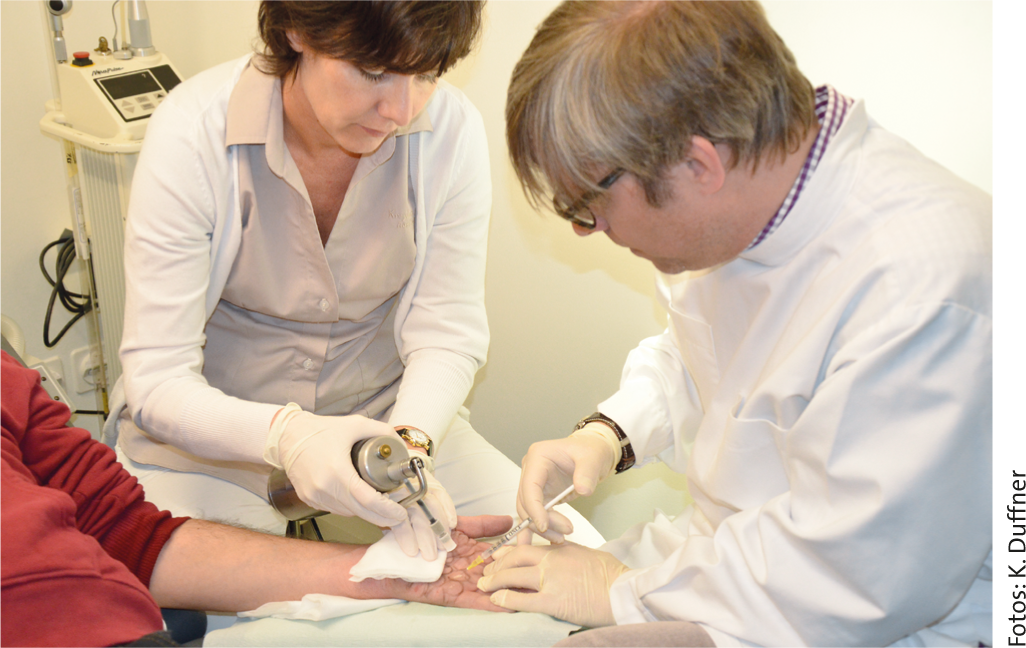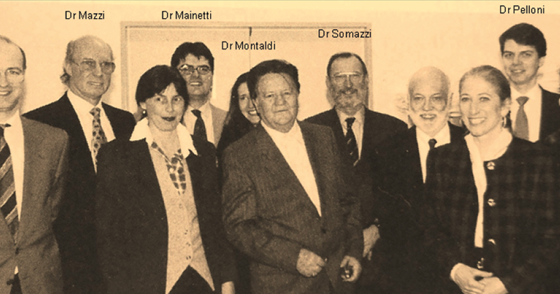Sweating is vital. However, if every handshake becomes a test of courage because sweat drips from the fingers, therapy can bring relief. Participants at the 4th Hyperhidrosis Workshop in Muttenz were able to learn how to tackle palmar hyperhidrosis with iontophoresis or botulinum toxin.
Shaking hands is a common greeting ritual in many Western countries, with origins dating far back into antiquity. For example, the Greek tomb relief of Thraseas and Euandria (ca. 375-350 B.C.) shows the two spouses shaking hands for what must have been their last farewell. For patients with palmar hyperhidrosis, hand gestures of greeting and farewell can become an almost insurmountable obstacle. After all, who likes to give and take a soaking wet hand?
Constantly wet hands
According to recent estimates, 2-3% of the population in Switzerland suffer from focal hyperhidrosis [1]. After the axillary form, palmar hyperhidrosis is the second most common manifestation. It often occurs already in young adults, either as a constant (continuous type) or phasic companion (discontinuous type), e.g. in stressful situations. In addition to the risk of social isolation, wet hands also hinder the use of tools, paper or writing instruments, so that in extreme cases even the choice of profession can be called into question. Moreover, hyperhidrosis of the hands not infrequently triggers dyshidrosiform eczema or nail damage. All in all, this can be very stressful for those affected, explained Oliver Kreyden, MD, at the 4th Hyperhidrosis Workshop in Muttenz.
Iontophoresis – a good therapy
For the treatment of palmar hyperhidrosis, either iontophoresis or botulinum toxin injections are recommended. In iontophoresis, the hands are placed in a bath through which a weak electric current flows (at least 20 mV). Although the mechanism of action is not yet well understood, current treatment probably induces postsynaptic disruption of the secretory epithelium. Initially, a half-hour session (2×15 min each limb) is repeated for ten consecutive days. The success rate of tap water iontophoresis is said to be around 80%. According to Dr. Kreyden, this makes it an “exceptionally good form of therapy.” Since increased sweating usually occurs again after a certain time, two to four sessions are necessary again after two to six weeks. For home iontophoresis (e.g., with a loaner device), the Muttenz dermatologist says, audio books have proven useful as a motivational aid during sessions.
Botulinum treatment with long lasting effect
Nevertheless, regular iontophoresis becomes bothersome to some patients over time, so treatment with botulinum toxin (BTX) is desired. To be sure that the entire palm is actually evenly covered with the drug, the area should be divided into regular circular zones with a pen(Fig. 1).

Fig. 1: For optimal treatment success, the palm is divided into regular circular zones.
Since anesthesia of the complete hand block can be associated with many disadvantages (pain, motor restrictions, hematomas, dizziness, etc.), a 30-minute iontophoresis bath in 2-percent lidocaine solution has proven effective for superficial anesthesia. Directly before the injection, each injection point is also briefly iced using cryotherapy(Fig. 2).

Fig. 2: Dr. Kreyden performing BTX treatment by injection and simultaneous icing kyrotherapy.
The smallest nozzle of the spray, or a 10-hole nozzle, should be used, otherwise there is a risk of frostbite. The pain, Dr. Kreyden said, is easily tolerated by patients using this method.
Three botulinum preparations are currently available in Switzerland: Botox®, Dysport® and Xeomin®. Botox® is the only drug approved for the treatment of axillary hyperhidrosis, whereas palmar hyperhidrosis is treated off-label. Botulinum blocks impulse transmission at the motor endplate by inhibiting the release of acetylcholine, thus blocking nerve signals to the sweat glands. Since the nerve endings can resprout after three to nine months, BTX treatment must also be repeated at longer intervals.
In any case, the patient present in Muttenz was very satisfied with the results of the approximately half-hour Botolinum therapy during the workshop. He won’t be back for another year, and until then he will be able to shake many hands without a care in the world.
Dr. Klaus Duffner
Source: April 20, 2013, 4th User Course Botulinum and Hyperhidrosis in Muttenz.
Literature:
- Kreyden O: In the fight against sweating. Dermatology Practice. 2010; 4: 11-14.











